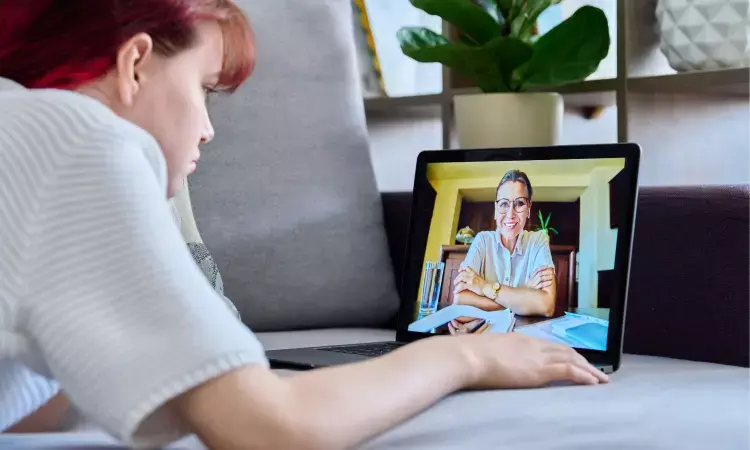- Home
- Medical news & Guidelines
- Anesthesiology
- Cardiology and CTVS
- Critical Care
- Dentistry
- Dermatology
- Diabetes and Endocrinology
- ENT
- Gastroenterology
- Medicine
- Nephrology
- Neurology
- Obstretics-Gynaecology
- Oncology
- Ophthalmology
- Orthopaedics
- Pediatrics-Neonatology
- Psychiatry
- Pulmonology
- Radiology
- Surgery
- Urology
- Laboratory Medicine
- Diet
- Nursing
- Paramedical
- Physiotherapy
- Health news
- Fact Check
- Bone Health Fact Check
- Brain Health Fact Check
- Cancer Related Fact Check
- Child Care Fact Check
- Dental and oral health fact check
- Diabetes and metabolic health fact check
- Diet and Nutrition Fact Check
- Eye and ENT Care Fact Check
- Fitness fact check
- Gut health fact check
- Heart health fact check
- Kidney health fact check
- Medical education fact check
- Men's health fact check
- Respiratory fact check
- Skin and hair care fact check
- Vaccine and Immunization fact check
- Women's health fact check
- AYUSH
- State News
- Andaman and Nicobar Islands
- Andhra Pradesh
- Arunachal Pradesh
- Assam
- Bihar
- Chandigarh
- Chattisgarh
- Dadra and Nagar Haveli
- Daman and Diu
- Delhi
- Goa
- Gujarat
- Haryana
- Himachal Pradesh
- Jammu & Kashmir
- Jharkhand
- Karnataka
- Kerala
- Ladakh
- Lakshadweep
- Madhya Pradesh
- Maharashtra
- Manipur
- Meghalaya
- Mizoram
- Nagaland
- Odisha
- Puducherry
- Punjab
- Rajasthan
- Sikkim
- Tamil Nadu
- Telangana
- Tripura
- Uttar Pradesh
- Uttrakhand
- West Bengal
- Medical Education
- Industry
Webcam-based telemedicine useful in internet use disorder and gaming disorders

Webcam-based telemedicine effectively treats internet use disorders (IUDs) and gaming disorders. Short-term, manualised, webcam-based online therapy reduces symptoms of IUDs, depression, and anxiety while increasing motivation for change and self-efficacy, according to a study published in EClinicalMedicine.
A systematic literature identifying 15 appropriate articles on the efficacy of several digital health interventions for IUDs reported positive effects of an online/webcam-based intervention.
Evidence-based treatments for IUDs are limited, and more data on online therapy approaches must be collected. In the present study, researchers investigated the efficacy of a manualised therapist-guided online intervention (OMPRIS) to reduce IUD symptoms and improve psychological well-being.
In this multicentre, two-arm, single-blinded trial, individuals ≥16 years suffering from IUD symptoms were recruited in Germany (August 16, 2020, to March 11, 2022) through media advertisements and healthcare providers. One hundred eighty individuals were randomised as 1:1 into two groups: a webcam-based OMPRIS intervention or a waitlist control (WLC) group.
Reduction in IUD symptoms was the primary outcome as measured by the Assessment of Internet and Computer Scale (AICA-S). Follow-ups were conducted at six weeks and six months.
Key findings in the study are:
- There were 89 patients in the OMPRIS intervention and 91 in the WLC arm.
- Outcome assessment in the OMPRIS intervention and WLC group was completed by 91 % and 96.7 % after treatment.
- OMPRIS participants had a greater reduction in AICA-S scores from baseline to post-treatment (mean score 12.1 to 6.8) compared to the WLC group (12.6 to 11.0), with an estimated mean difference of −3.9.
- No adverse events were recorded.
The study interpreted the effectiveness and superiority of Webcam-based OMPRIS therapy in reducing IUD symptoms.
They said, “Webcam-based, specialised online therapy increases IUD treatment options. It is a valuable option for those with motivational issues, feelings of shame and limited access due to long waiting lists.
Further reading:
Dieris-Hirche Efficacy of a short-term webcam-based telemedicine treatment of internet use disorders (OMPRIS): a multicentre, prospective, single-blind, randomised, clinical trial. EClinicalMedicine, 64, 102216. https://doi.org/10.1016/j.eclinm.2023.102216
BDS, MDS in Periodontics and Implantology
Dr. Aditi Yadav is a BDS, MDS in Periodontics and Implantology. She has a clinical experience of 5 years as a laser dental surgeon. She also has a Diploma in clinical research and pharmacovigilance and is a Certified data scientist. She is currently working as a content developer in e-health services. Dr. Yadav has a keen interest in Medical Journalism and is actively involved in Medical Research writing.
Dr Kamal Kant Kohli-MBBS, DTCD- a chest specialist with more than 30 years of practice and a flair for writing clinical articles, Dr Kamal Kant Kohli joined Medical Dialogues as a Chief Editor of Medical News. Besides writing articles, as an editor, he proofreads and verifies all the medical content published on Medical Dialogues including those coming from journals, studies,medical conferences,guidelines etc. Email: drkohli@medicaldialogues.in. Contact no. 011-43720751


